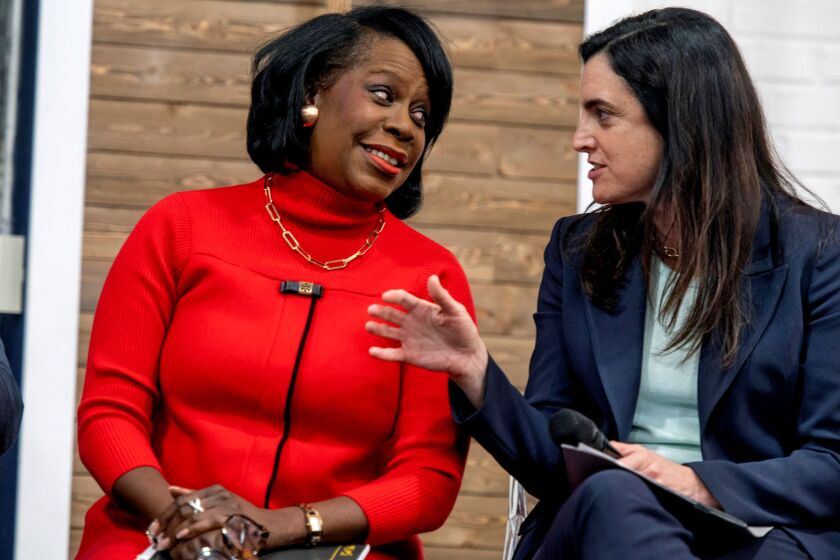Parker won the Democratic nomination handily Tuesday night in a crowded race that many expected to be a nail-biter. Parker will face former Councilmember David Oh, who was unchallenged in Tuesday’s Republican primary, in the November general election. If she wins — a near certainty in a city that hasn’t elected a Republican mayor in 70 years — she’ll be Philadelphia’s first woman mayor.
Democratic voters had an unusually diverse set of candidates to choose from on Tuesday. Parker, who was the only viable Black candidate to stay in the race until Election Day, earned about a third of the overall vote, according to the most recent count. The second-place candidate, Rebecca Rhynhart, a former city controller, had 22 percent of the vote, while Helen Gym, a former councilmember and the progressive favorite, had 21 percent. A combined 20 percent of the vote went to Allan Domb, a former councilmember and real estate broker, and Jeff Brown, the owner of a chain of supermarkets.
While Parker won by a convincing margin, the results reflected weak turnout in the city, and highlighted the limitations of the city’s electoral system. Many local civic groups have begun a push to institute ranked-choice voting, which allows voters to select multiple candidates based on their preferences and, advocates say, creates more consensus-driven outcomes. In other cities, like Chicago, runoff elections are held if no candidate manages to earn majority support in the first round of voting. The race appeared to be anyone’s game until the final days. The first polls weren’t released until late April, and all the polls suggested that Parker, Rhynhart and Gym were essentially tied for first place.
While Parker’s victory is a significant first for Philadelphia, she was in some ways an establishment candidate. She had a strong base of voters in the Northwest Philadelphia neighborhoods that she represented in the City Council, and earned early support from the building trades unions, which have long been a powerful force in Philadelphia politics. She’s also been allies with outgoing Mayor Jim Kenney, who won the 2015 primary in a landslide but has become deeply unpopular in the last years of his term-limited tenure. Kenney declined to make an endorsement in the race — no one asked for it, presumably — but told a reporter in May that he had voted for Parker himself.
The result was a stark disappointment for the progressive movement that backed Helen Gym, who spent years as a public education activist before winning a City Council seat in 2015. In her last election in 2019, Gym earned 100,000 votes — more than anyone else in the city — and was immediately seen as a front-runner to replace Kenney when his term expired. She ran for mayor with the support of the teachers’ union and a network of local progressive groups, and held rallies in the final days of her campaign with national progressive leaders like Congresswoman Alexandria Ocasio-Cortez and Sen. Bernie Sanders.
But in contrast to Chicago, which elected former teacher and labor organizer Brandon Johnson in April, Philadelphia’s most progressive candidate fell short. That could be partly explained by the dynamic of that election, says Mustafa Rashed, a veteran Philadelphia political consultant and lobbyist: In Chicago, Johnson, a Black man, won the runoff against Paul Vallas, a white man and former Republican who emphasized law and order. Tuesday’s election also showed relatively stronger turnout among older African American voters than among the younger progressives who make up Gym’s base of supporters.
“If I’m waiting on progressives and millennials to show up on Election Day, I’m sorry, but in a municipal election they’re going to break your heart,” Rashed says.
Still, it was a surprise to see how large Parker’s margin of victory was, and Gym’s third-place finish, Rashed says.
“It just wasn’t a binary choice. Votes really did go all over the place,” he says.
Parker was the youngest Black woman ever elected to the Pennsylvania House of Representatives, as Governingnoted when it honored her as part of its Women in Government program in 2017. She has long been a champion for so-called “middle neighborhoods,” encouraging investment in stable but declining areas of homeownership to prevent them from slipping into poverty. She has built strong relationships with other local, state and federal political leaders. A dynamic speaker — “her conversational flow is like an unstoppable freight train,” as Governingonce wrote — Parker spent much of her primary campaign emphasizing public safety issues.
Assuming she wins the general election, she’ll take charge of a city beset by crises, including spiraling gun violence, uncertain budget prospects, stagnant population growth and a transit system on the verge of financial collapse. She’s been criticized by progressive groups for vowing to hire more cops, and for suggesting she’s open to the controversial practice of stop and frisk. She’ll have substantial room to define her governing style over the course of the general election campaign and potential transition period, but Rashed says voters should expect consistency.
“She wants to work with people. She has strong relationships and she wants to bring people together,” Rashed says. “I think pragmatism was the theme of this campaign.”
For his part, the Republican nominee is conceding nothing. David Oh spent much of Election Day replying to people on Twitter to remind them that the “real election” is in November. “The winner of the Democratic primary may get less than 75,000 votes,” Oh said in one tweet. “That will result in a very close race in the general election that will receive little to no coverage until the final weeks of the race.”
Related Articles














